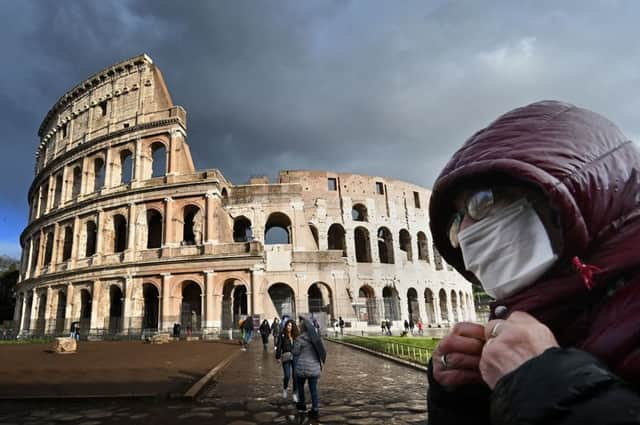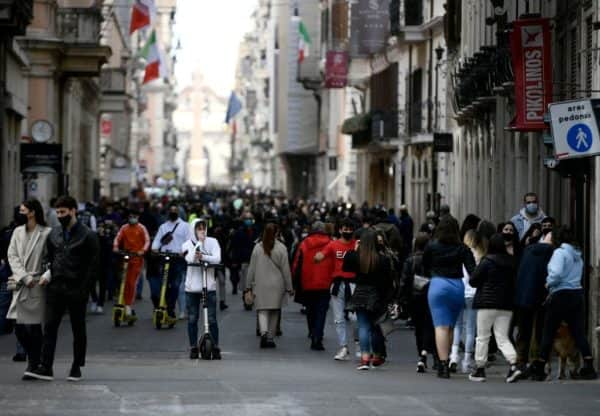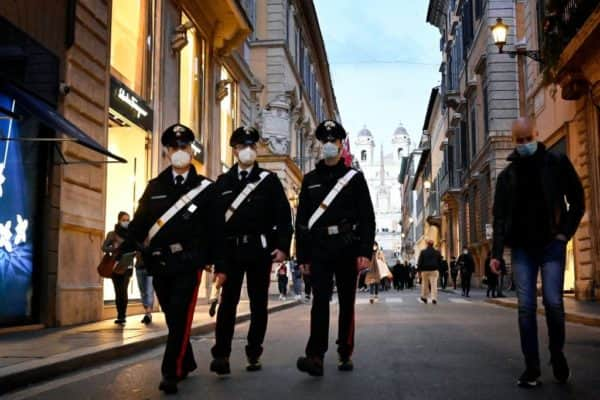Italy is back in lockdown after signs of a 'new wave' of Covid-19 - here's why


As the devolved nations of Britain continue to make pace on their respective roadmaps out of lockdown, on the continent, talk of a “third wave” of coronavirus is increasing.
Many countries in mainland Europe have faced delays in getting their vaccinations up and running to the speed we are seeing in the UK, and it is thought that a lower percentage of inoculated citizens could be to blame for surging case numbers.
Advertisement
Hide AdAdvertisement
Hide Ad“A number of countries around Europe are now seeing an increase in cases again,” said Professor Andrew Pollard, director of the Oxford vaccine group. “Italy and France and Germany and Poland – all have the start of a new surge in cases."
Speaking on BBC Radio 4’s Today programme, Prof Pollard said it is “absolutely critical” that Britain does not develop “a problem of not vaccinating people” in the face of as yet unproven worries surrounding the safety of the Oxford/AstraZeneca jab.
Italy, one of the first countries to impose a national lockdown last year, has reinforced widespread restrictions yet again, with a complete shutdown over the Easter weekend in April planned.
Here is everything you need to know about it.
What are the lockdown rules in Italy?
From 15 March, large swathes of the country will woke up to new restrictions.
Advertisement
Hide AdAdvertisement
Hide AdSchools, shops and restaurants have been shuttered across most of Italy – including two of its most populous regions surrounding the major cities of Rome and Milan – and a stay at home order is in place.
Residents may only leave their homes for work, health or other essential reasons.
The tough new restrictions will last until the Easter weekend on 3 – 5 April, at which point they will get even tougher in an effort to avoid the spread of infection.
On 3 April, the entire country will be placed into the high-risk “red zone” category to combat rising case numbers.
Advertisement
Hide AdAdvertisement
Hide AdWhy are restrictions being brought back?


Italy has seen rises in infection numbers in recent weeks, and now posts daily totals of over 25,000 new cases.
The GIMBE health think-tank has said hospital and intensive care units in most of Italy’s regions are “overloaded”, and the island of Sardinia is the only region where infection rates are low.
Announcing the new measures, Italian Prime Minister Mario Draghi warned of a “new wave” of the virus, and said he was ”aware” that the restrictions will “have consequences on the education of your children, on the economy and on everyone's mental health.”
But he said they are “necessary to avoid a worsening of the situation that would require even stricter measures.”
Advertisement
Hide AdAdvertisement
Hide AdItaly’s total number of Covid-19 related deaths stands at over 100,000, and is second in Europe to only the UK.
Why is Italy’s vaccination programme struggling?
Italy and other neighbouring European countries have seen their vaccinations programmes struggle to get off the ground, with delays and low stock levels of the Oxford/AstraZeneca jab blamed on export restrictions.
The Anglo-Swedish drug company behind the vaccine announced it would be cutting a large amount of the 100 million doses expected in the EU in January, which ignited diplomatic tensions with the European Commission.
Last week (10 March), it was claimed by the European Council president that the UK had imposed an “outright ban” on coronavirus vaccine exports, when Charles Michel accused Britain and the US of imposing bans on the movement of jabs in a newsletter.
Advertisement
Hide AdAdvertisement
Hide AdBoris Johnson hit back, telling MPs that the UK has not “blocked the export of a single Covid-19 vaccine” as he sought to correct the suggestion.
“Let me be clear: we have not blocked the export of a single Covid-19 vaccine or vaccine components,” the Prime Minister said. “This pandemic has put us all on the same side in the battle for global health; we oppose vaccine nationalism in all its forms.”
The Italian government last week blocked the export of a quarter of a million doses of the vaccine to Australia, to make up for shortfalls in its own inventory.
How many people have been vaccinated in Italy?


As of 14 March, over 6.7 million people had received at least one dose of a coronavirus vaccination in Italy (around 11 per cent of the countries population).
Nearly 2 million people have been administered both doses.
Advertisement
Hide AdAdvertisement
Hide AdIs the Oxford/AstraZeneca jab safe?
Europe’s sluggish vaccination campaigns may see further setbacks, as countries including Denmark, Norway and the Republic of Ireland announced they would be temporarily suspending deliveries of the jab amid concern around blood clots.
Italy has not suspended the vaccine outright, but has paused the use of certain batches of it as investigations continue.
But so far, there has been no evidence to suggest a link between the jab and increased instances of blood clots.
Professor Andrew Pollard, director of the Oxford vaccine group, which developed the Oxford/AstraZeneca jab, said “safety is clearly absolutely paramount” but no link had been found between the vaccine and blood clots.
Advertisement
Hide AdAdvertisement
Hide AdHe told BBC Radio 4’s Today programme it was “important to understand that a lot of stuff happens to people all the time in normal times and, in the case of blood clots here in the UK, we see about 3,000 cases of blood clots happening every month.
“So, when you then put a vaccination campaign on top of that, clearly those blood clots still happen and you’ve got to then try and separate out whether, when they occur, they are at all related to the vaccine or not.”
Finland has also done a “very careful study” and has not found an increased risk he added, "but of course it’s absolutely right that there’s careful monitoring of safety and this gets looked into.”
Professor Anthony Harnden, deputy chairman of the Joint Committee on Vaccination and Immunisation, told BBC Breakfast: “One ought to also remember that Covid causes blood clots. So, the risks of not having the Covid vaccination far outweigh the risks from the vaccinations.”
A version of this article originally appeared on our sister title, the Edinburgh Evening News